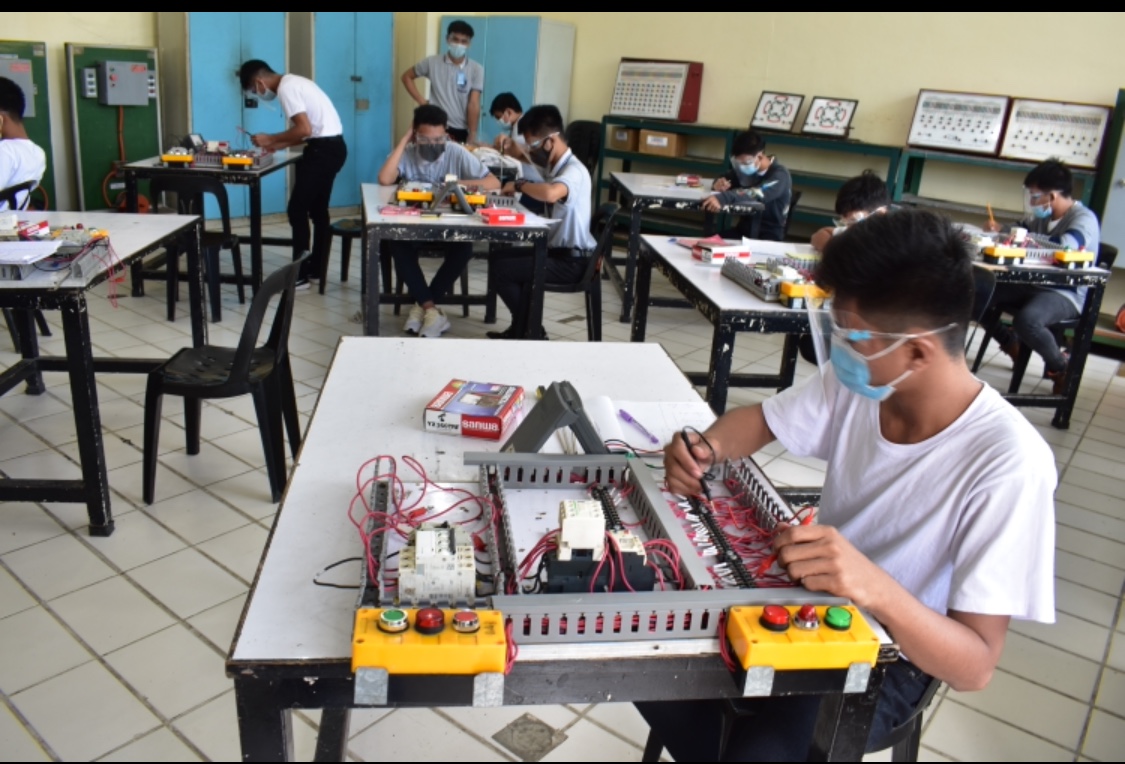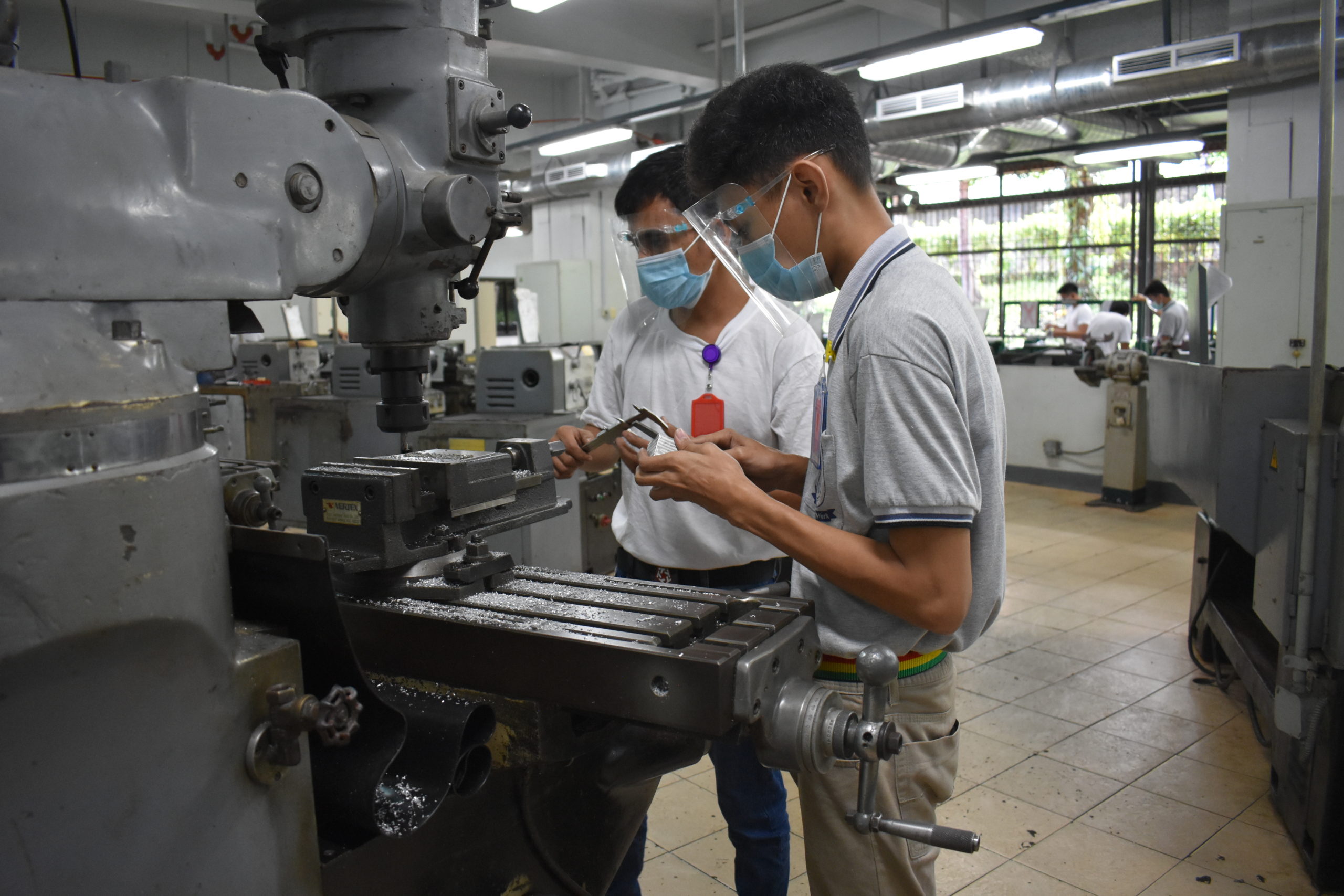Learning by doing

GERMAN SOLUTION DTCFI was founded to address the demand of industries for skilled workers and to help reduce unemployment and poverty in the country. —CONTRIBUTED PHOTOS
While many schools struggle to meet the challenge of matching student training with actual skills requirements in the labor force, a little known educational institution in Calamba, Laguna, has lessened the guessing and uncertainty.
Dualtech Training Center Foundation, Inc. (DTCFI) in Carmelray Industrial Park 1, established in 1982, has adopted a system used in Germany and other European countries that allows students to learn both in school and in their prospective employers’ workplaces.
The dualtech system goes beyond the typical internship or on-the-job training that requires students to spend a set number of hours in a company that may not even let them do the kind of work they are preparing for. For Dualtech students, immersion in the job and hands-on training are not theoretical concepts.
Jerry Muhi, executive director, explains, “Dual training system is an educational method where students have two learning venues—school and companies, a combination of theoretical and practical training.”
He adds, “Since Dualtech has two learning venues, this enables the students to experience the actual work condition in companies and apply the fundamentals of electromechanics, a bundle of three trades, [while still in] school. This makes Dualtech distinct among technical-vocational institutions under the umbrella of Tesda (Technical Education and Skills Development Authority).”
Dualtech offers the two-year Electromechanics Technology course, a combination of electrical, mechanical and electronics trades designed to serve as the foundation for more advance technical subjects and applications. Enrollment is year-round but only males can apply.
Its training program consists of 30 percent theoretical and 70 percent practical. Muhi says “this unique education and intensive hands-on component with different industries allow students, before they leave school, to experience the interplay of electrical, mechanical and electronics trades.”
But the school also “pays special attention to the values formation of our students, making them responsible, industrious and professional workers,” Muhi stresses.
Skilled workers
DTCFI was founded to address the demand of industries for skilled workers and to help reduce unemployment and poverty in the country. It adopted the German dualtech system as it was set up with the help of the Hanns Siedel Foundation of Germany. The German model, Muhi says, aims to combine systematically the advantages of training in a company and education in the school.
Like the rest of the country, the COVID-19 pandemic was devastating for Dualtech.
Muhi says their 1,600 students were stranded in the campus due to the lockdown. “We spent millions of pesos supporting these students with food, lodging and other basic personal needs … we reallocated funds to sustain the students who came from different provinces … a good number from Visayas and Mindanao. The fund we used should have been for the tuition assistance and subsistence support of incoming students for 2021.”
Donations
Although donations started coming in by early 2021, they were not enough to provide for the target of 1,000 new students. Fortunately, Muhi was linked by a priest friend to Robert Joseph, immediate past president of Rotary Club of Manila (RCM).
Joseph, with RCM members Thad Liamzon, Nagi Zeitouni and Anton Mauricio, offered to sponsor new students. “During our conversation, I realized how our RCM visitors appreciate the program of Dualtech—giving a chance for less privileged youths to have a unique technical education that will enable them to reach their dreams and contribute to nation-building. … With RCM’s help, Dualtech can continue reaching out [to disadvantaged youths] to pursue an education [and fulfill their] dreams … ,” Muhi says.
He points out that helping Dualtech train more young people also means supporting their families and communities “thus creating a bigger wave of coverage to alleviate poverty.”
Since it opened four decades ago, DTCFI has graduated more than 13,000 students. Muhi says Dualtech graduates are spread across industries here and abroad. They are entrepreneurs, employees and executives.
To enroll at Dualtech, applicants have to be graduates of senior high school or alternative learning systems, 17-21 years old, physically fit and single. Students pay P30,000 for the whole two years to cover the use of Dualtech facilities, training materials and equipment. Scholarships are granted if funds are available.
At present, Dualtech has 14 technical instructors and 12 mentors. Technical instructors have to pass Tesda’s Training Methodology test. They also have to have at least one year of work experience.

